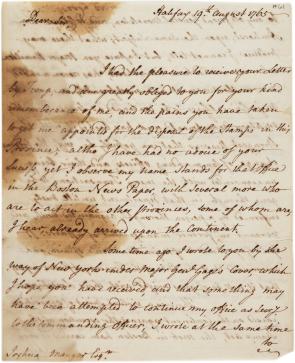A report on the reaction to the Stamp Act, 1765
A Spotlight on a Primary Source by Archibald Hinshelwood
 On March 22, 1765, the British Parliament passed the “Stamp Act” to help pay for British troops stationed in the colonies during the Seven Years’ War. It required the colonists to pay a tax, represented by a stamp, on various papers, documents, and playing cards. It was a direct tax imposed by the British government without the approval of the colonial legislatures and was payable in hard-to-obtain British sterling, rather than colonial currency. Further, those accused of violating the Stamp Act could be prosecuted in Vice-Admiralty Courts, which had no juries and could be held anywhere in the British Empire.
On March 22, 1765, the British Parliament passed the “Stamp Act” to help pay for British troops stationed in the colonies during the Seven Years’ War. It required the colonists to pay a tax, represented by a stamp, on various papers, documents, and playing cards. It was a direct tax imposed by the British government without the approval of the colonial legislatures and was payable in hard-to-obtain British sterling, rather than colonial currency. Further, those accused of violating the Stamp Act could be prosecuted in Vice-Admiralty Courts, which had no juries and could be held anywhere in the British Empire.
Adverse colonial reaction to the Stamp Act ranged from boycotts of British goods to riots and attacks on the tax collectors. In this letter, Archibald Hinshelwood, merchant and rising politician from Nova Scotia, described his impressions of the Stamp Act and of the resulting colonial unrest: “There is a violent spirit of opposition raised on the Continent against the execution of the Stamp Act, the mob in Boston have carried it very high against Mr. Oliver the Secry (a Town born child) for his acceptance of an office in consequence of that act. They have even proceeded to some violence, and burnt him in effigy &c.” Despite the evidence of hostility in the colonies to the south, Hinshelwood was hoping to be appointed a tax collector in Halifax. Although the Stamp Act occurred eleven years before the Declaration of Independence, it defined the central issue that provoked the American Revolution: no taxation without representation.
A full transcript is available.
Excerpt
There is a violent spirit of opposition raised on the Continent against the execution of the Stamp Act, the mob in Boston have carried it very high against Mr. Oliver the Secry (a Town born child) for his acceptance of an office in consequence of that act. They have even proceeded to some violence, and burnt him in Effigy &c. They threaten to pull down & burn the Stamp Office now building, and that they will hold every man as Infamous that shall presume to carry the Stamp Act into Execution; so that it is thought Mr. Oliver will resign. I don’t find any such turbulent spirit to prevail among us, if it should, the means are in our Hands to prevent any tumults or Insults; what the consequences may be in the Colonies who have no military force to keep the rabble in order, I cannot pretend to say.
